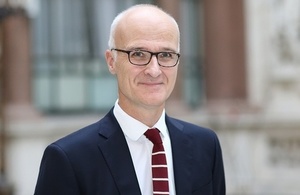- Pacific Islands, including Fiji, Vanuatu, and the Marshall Islands are on the frontline of climate change and are already facing rising sea levels that could undermine livelihoods, security and human rights.
- the UK is playing a leading role at the UN Secretary General’s climate conference in 2019 to accelerate the transition to a climate resilient planet.
- to date, the UK has invested over £70 million in the Pacific, focusing on strengthening climate resilience and addressing security issues.
Energy and Clean Growth Minister Claire Perry has emphasised the UK’s commitment to support the Pacific Islands in combating climate change.
Opening the UK/New Zealand Wilton Park Forum on Climate Change and Resilience in the Pacific yesterday (16 December 2018), Claire Perry championed climate vulnerable nations and reminded governments, businesses, and international organisations everywhere of their absolute duty to tackle the biggest threat of our time.
The event, jointly hosted by the UK, New Zealand and the Pacific Island Forum, turned discussions and recommendations into practical solutions in areas including multilateral negotiations, oceans, plastics, finance, risk assessment and migration, deepened engagement between the UK and Pacific Island leaders and promoted new stakeholder partnerships to enhance future collaboration.
Speaking at the Forum, Energy and Clean Growth Minister Claire Perry said:
The Pacific Islands are small, but they are mighty. Despite hardly contributing to climate change, they are driving international action to reduce emissions and building the resilience of their communities. We can learn so much from them.
With the UK’s world-leading expertise in tackling climate change and the Pacific Islands’ determination, we will work closely together to find practical solutions and drive transformational change.
The UK has a longstanding relationship with the Pacific Islands and a shared agenda on Climate Change. During the COP24 summit in Poland last week, Claire Perry launched the UK’s new Capacity Building for international negotiations Programme (CaBIN). The £15.6 million technical assistance programme will increase the capacity of low income and climate vulnerable countries to become leading voices in international climate negotiations.
In addition, the government is providing £1.2 million in funding to support a Pacific Regional Nationally Determined Contributions Hub to support these countries in implementing their Paris Agreement commitments.
Foreign and Commonwealth Office Minister responsible for Climate Change, Mark Field, welcomed the delegates at the beginning of the Forum:
The countries of the Pacific are at the forefront of the fight against climate change and we have much to learn from one another.
Failure to recognise that these challenges are coming down to the line, and to find ways to mitigate them, or to sufficiently adapt to them, in advance, is no longer an option.
Throughout COP24, the UK cemented its position as a global leader in tackling climate change and achieved:
- driving genuine climate action to ensure a level playing-field for every country and doing its bit to secure a robust rulebook that applies to all nations
- urging higher global ambition, by ensuring the Talanoa Dialogue, which takes stock of collective global efforts to reduce emissions in line with the Paris Agreement, results in a firm commitment from all countries to review and update their international Nationally Determined Contributions (NDCs)
- continuing to play an active role in the negotiations while promoting UK experience and showcasing the scale and impact of UK International Climate Finance (ICF)
- since 1990 the UK economy has grown by 71 per cent while emissions have fallen by 43 per cent – the fastest progress on decarbonisation in the G20 since 2000
